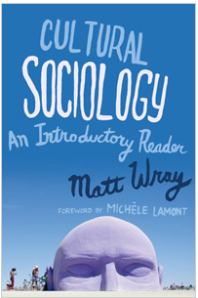 [Re-blogged from New Books in Critical Theory]
[Re-blogged from New Books in Critical Theory]Interview (audio) with Tony Bennett on his new book “Making Culture, Changing Society”
 [Re-blogged from New Books in Critical Theory]
[Re-blogged from New Books in Critical Theory] [Re-blogged from New Books in Critical Theory]
[Re-blogged from New Books in Critical Theory]
The special issue of Cultural Sociology on Field Analysis in Cultural Sociology edited by Mike Savage and Elizabeth B. Silva is currently available open access.
Theresa Sauter
New Media and Society
Published online before print July 8, 2013, doi: 10.1177/1461444813495160
http://nms.sagepub.com/content/early/2013/07/05/1461444813495160
Abstract
In the context of modern western psychologised, techno-social hybrid realities, where individuals are incited constantly to work on themselves and perform their self-development in public, the use of online social networking sites (SNSs) can be conceptualised as what Foucault has described as a ‘technique of self’. This article explores examples of status updates on Facebook to reveal that writing on Facebook is a tool for self-formation with historical roots. Exploring examples of self-writing from the past, and considering some of the continuities and discontinuities between these age-old practices and their modern translations, provides a non-technologically deterministic and historically aware way of thinking about the use of new media technologies in modern societies that understands them to be more than mere tools for communication.
Teaching cultural sociology and looking for a textbook? This new collection of essays may be just what you’re after.
Cultural Sociology: An Introductory Reader
by Matt Wray
 A comprehensive and clever mix of classic and contemporary essays on the sociology of culture.
A comprehensive and clever mix of classic and contemporary essays on the sociology of culture.
Cultural sociology has grown to exercise a deep influence on other subfields over the last forty years, on areas such as the study of race and ethnicity, education, social movements, economic sociology, and political sociology. This mix of essays is an essential resource for understanding this fast growing, dynamic area of sociology. An introduction outlines the building blocks of a sociological approach to studying culture, and helpful headnotes guide students through each reading.
See the publisher’s website for an overview of included essays and PDF access to the introductory chapter.
Some interesting recent publications co-authored by CS group members:
Singh, P., Märtsin, M., Glasswell, K. (2013). Knowledge Work at the Boundary: Making a Difference to Educational Disadvantage. Learning, Culture and Social Interaction, In Press, Corrected Proof, Available online 15 March 2013
Singh, P.,Thomas, S. & Harris, J. (2013) Recontextualising policy discourses: a Bernsteinian perspective on policy interpretation, translation, enactment, Journal of Education Policy, DOI:10.1080/02680939.2013.770554